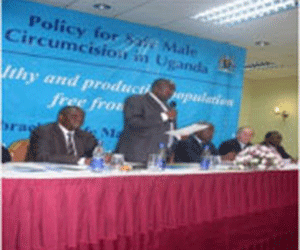On 14 September, 2010, Uganda’s Ministry of Health launched the long-awaited policy on safe male circumcision for HIV prevention, during a ceremony presided over by the Minister of State for Health Honourable Dr. Richard Nduhura.
WHO and UNAIDS recommended in 2007 that adult male circumcision be adopted by countries as part of their HIV prevention intervention. The national policy and campaign strategy is much needed in Uganda where only 25% of adult men are circumcised.
The policy seeks to contribute towards the reduction of HIV and other sexually transmitted infections through safe male circumcision. It will guide the planning, implementation and delivery of safe male circumcision services as part of routine health services.
Alongside the policy, the Minister of State also launched the National SMC Communication Strategy that is intended to coordinate and standardize messages on safe male circumcision for HIV prevention in Uganda.
More than 150 representatives from government, partner agencies, health implementers, and the media attended the launch. Speaking during the ceremony, PEPFAR Coordinator in Uganda, Mr. Mike Strong, noted that safe male circumcision has been identified as one of the priority prevention interventions that needs to be scaled up in Uganda. PEPFAR, through various implementing partners, currently supports capacity building for surgical staff, improving facilities and information dissemination about the benefits of safe male circumcision.
WHO country representative for Uganda, Dr. Joaquim Saweka, emphasised the need to consider SMC as part of the comprehensive HIV prevention package.
Led by CCP, Health Communication Partnership (HCP) has worked closely with Uganda’s Ministry of Health to provide technical assistance in the development of the Safe Male Circumcision Communication Strategy and has assisted in setting the stage for the national policy. HCP provided support to the ministry with a visible launch ceremony that received good coverage in the press about the issue. HCP has been working to disseminate the new policy to all partners and district health services in the country.





